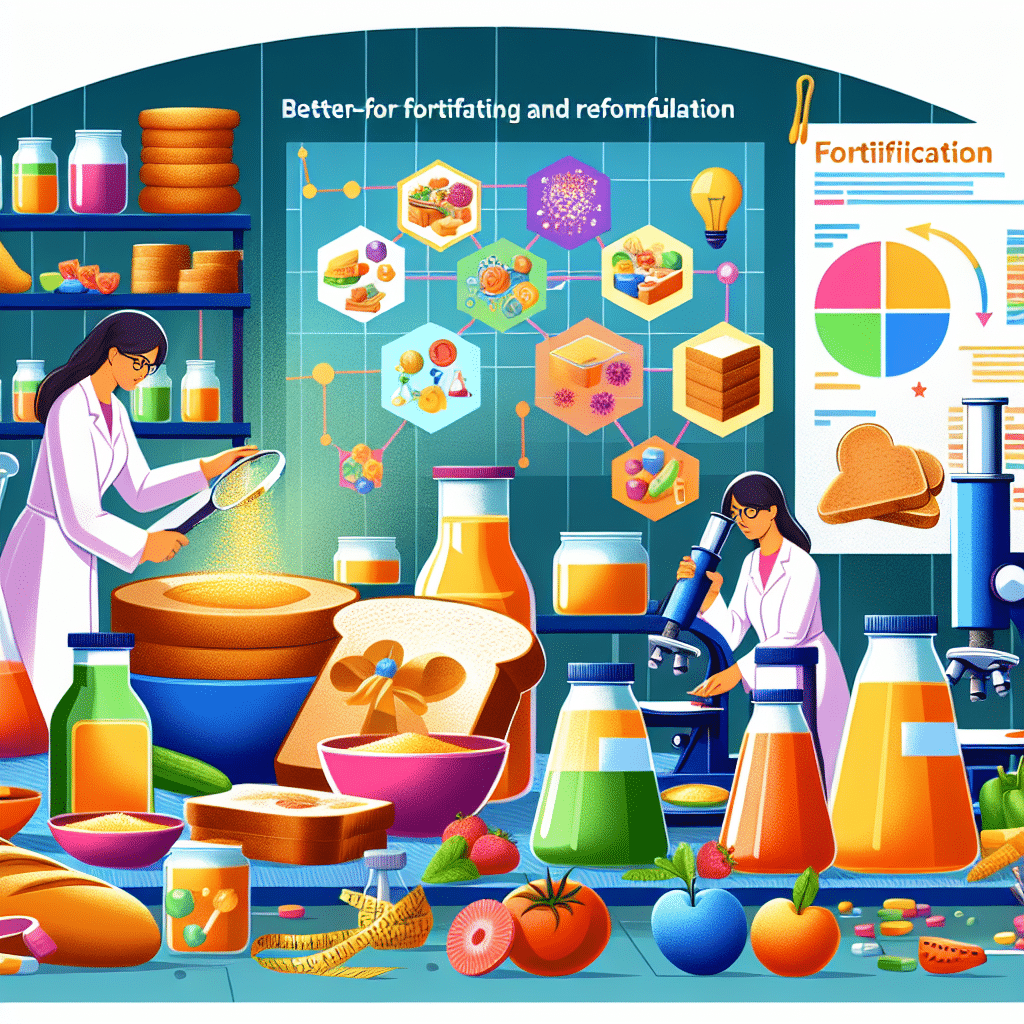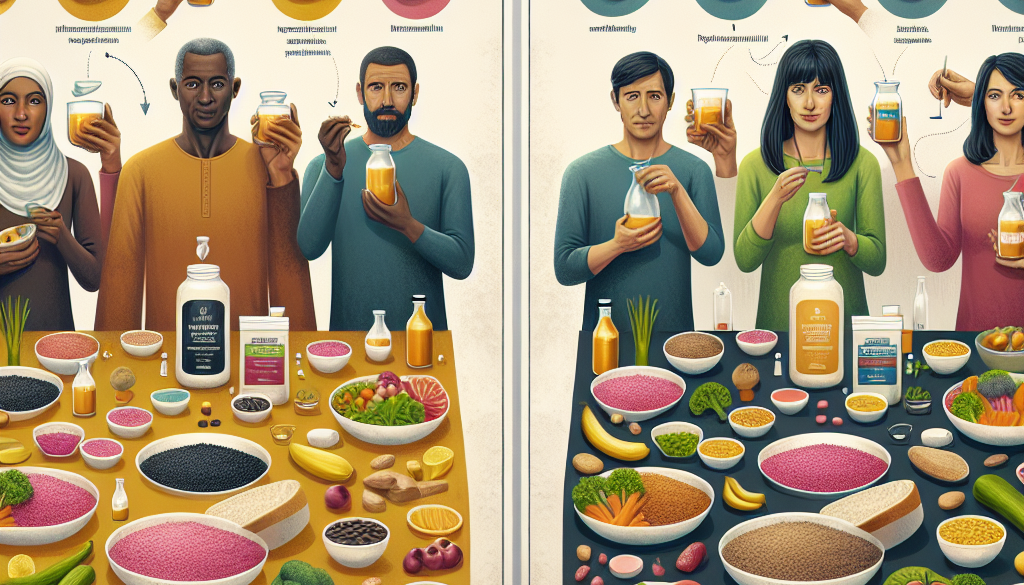Better-for-you Through Fortification and Reformulation
-
Table of Contents
- Better-for-You Foods: The Rise of Fortification and Reformulation
- Understanding Food Fortification
- The Reformulation Revolution
- Case Studies: Fortification and Reformulation in Action
- Challenges and Considerations
- Future Trends in Fortification and Reformulation
- Conclusion: Embracing a Healthier Future
- Enhance Your Nutrition with ETprotein’s High-Quality Protein Products
Better-for-You Foods: The Rise of Fortification and Reformulation

In an era where health consciousness is on the rise, consumers are increasingly looking for food options that not only satisfy their taste buds but also contribute to their well-being. The food industry has responded by embracing the concepts of fortification and reformulation, aiming to create ‘better-for-you’ products that are both nutritious and delicious. This article delves into the transformative journey of food fortification and reformulation, exploring how these processes are shaping a healthier future for consumers worldwide.
Understanding Food Fortification
Food fortification is the process of adding essential vitamins and minerals to foods to prevent nutritional deficiencies and improve public health. This proactive approach to nutrition has been instrumental in combating global health issues such as anemia, rickets, and neural tube defects. Fortification can be categorized into two types:
- Mass Fortification: This involves adding nutrients to staple foods such as bread, milk, and salt, targeting the general population.
- Targeted Fortification: This focuses on specific groups like infants, pregnant women, or the elderly, with products like baby formulas and cereals enriched with specific nutrients.
Examples of successful fortification efforts include the addition of iodine to salt, which has significantly reduced the incidence of goiter, and the fortification of flour with folic acid, which has decreased the occurrence of neural tube defects in newborns.
The Reformulation Revolution
Reformulation involves altering the recipe of a food product to improve its nutritional profile without compromising on taste or quality. This can mean reducing ‘negative’ nutrients such as sugar, salt, and trans fats, or increasing ‘positive’ ones like fiber, protein, and beneficial fats. The reformulation movement has gained momentum as consumers demand healthier versions of their favorite foods.
Notable reformulation success stories include:
- Reducing sugar in breakfast cereals without affecting flavor.
- Lowering sodium content in canned soups and snacks.
- Introducing whole grain options for pasta and bread.
These changes have made it easier for consumers to make healthier choices without drastically altering their eating habits.
Case Studies: Fortification and Reformulation in Action
Several case studies highlight the positive impact of fortification and reformulation:
- Project Stealth: A strategy employed by some companies involves gradually reducing sugar and salt content over time, allowing consumers’ palates to adapt without noticing significant taste differences.
- Public Health Initiatives: Governments and health organizations have partnered with the food industry to increase the availability of fortified foods in regions with high rates of micronutrient deficiencies.
Statistics show that such initiatives have led to measurable improvements in public health. For instance, after the U.S. mandated folic acid fortification, there was a 28% reduction in neural tube defects.
Challenges and Considerations
While fortification and reformulation offer significant benefits, they also present challenges:
- Nutrient Stability: Ensuring that added nutrients remain stable during processing and shelf life.
- Consumer Acceptance: Balancing nutritional improvements with taste and texture to maintain consumer loyalty.
- Regulatory Compliance: Navigating the complex regulations that govern food fortification and reformulation.
Companies must address these challenges to successfully deliver better-for-you products to the market.
Future Trends in Fortification and Reformulation
The future of food fortification and reformulation is promising, with trends indicating a continued focus on health and wellness:
- Plant-based Innovations: As plant-based diets gain popularity, there is a growing demand for fortified vegan and vegetarian products.
- Personalized Nutrition: Advances in technology may lead to personalized fortified foods tailored to individual nutritional needs.
- Sustainability: Reformulation efforts are increasingly considering the environmental impact of ingredients and production processes.
These trends suggest that the better-for-you food movement will continue to evolve, offering consumers a wider range of healthful options.
Conclusion: Embracing a Healthier Future
The fortification and reformulation of food products represent a significant step towards a healthier society. By enriching foods with essential nutrients and improving their nutritional profiles, the food industry is playing a crucial role in addressing public health concerns. As consumers become more health-conscious, the demand for better-for-you products is likely to grow, driving further innovation in this space. The key takeaways from this article are the importance of fortification and reformulation in improving public health, the challenges faced by the industry, and the promising trends that will shape the future of nutrition.
Enhance Your Nutrition with ETprotein’s High-Quality Protein Products
If you’re looking to incorporate high-quality protein into your diet, ETprotein offers a range of organic bulk vegan proteins that are perfect for fortification and reformulation. Their products, including rice protein, pea protein, and various seed proteins, are non-GMO, allergen-free, and feature a neutral taste, making them ideal for a variety of applications. Whether you’re a manufacturer looking to create better-for-you products or a consumer seeking to boost your protein intake, ETprotein’s offerings can help you meet your nutritional goals.
About ETprotein:
ETprotein, a reputable protein and L-(+)-Ergothioneine (EGT) Chinese factory manufacturer and supplier, is renowned for producing, stocking, exporting, and delivering the highest quality organic bulk vegan proteins and L-(+)-Ergothioneine. They include Organic rice protein, clear rice protein, pea protein, clear pea protein, watermelon seed protein, pumpkin seed protein, sunflower seed protein, mung bean protein, peanut protein, and L-(+)-Ergothioneine EGT Pharmaceutical grade, L-(+)-Ergothioneine EGT food grade, L-(+)-Ergothioneine EGT cosmetic grade, L-(+)-Ergothioneine EGT reference grade and L-(+)-Ergothioneine EGT standard. Their offerings, characterized by a neutral taste, non-GMO, allergen-free attributes, with L-(+)-Ergothioneine purity over 98%, 99%, cater to a diverse range of industries. They serve nutraceutical, pharmaceutical, cosmeceutical, veterinary, as well as food and beverage finished product distributors, traders, and manufacturers across Europe, USA, Canada, Australia, Thailand, Japan, Korea, Brazil, and Chile, among others.
ETprotein specialization includes exporting and delivering tailor-made protein powder and finished nutritional supplements. Their extensive product range covers sectors like Food and Beverage, Sports Nutrition, Weight Management, Dietary Supplements, Health and Wellness Products, and Infant Formula, ensuring comprehensive solutions to meet all your protein needs.
As a trusted company by leading global food and beverage brands and Fortune 500 companies, ETprotein reinforces China’s reputation in the global arena. For more information or to sample their products, please contact them and email sales(at)ETprotein.com today.














